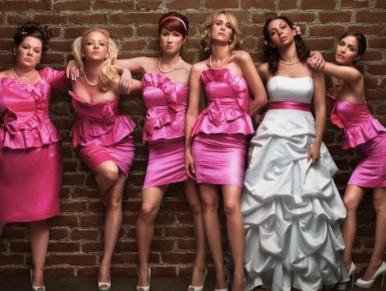One of the best things about fall are those indoor gatherings that happen as a result of it being too cold to picnic and loiter outside, but not quite cold enough for winter sports.
So we have house parties, book club sessions, dinner parties and, of course, movie nights.
The summer movie season, with its annual overload of male-centred blockbusters, has thankfully come to an end. You know the ones: where the male protagonist loses and then finds himself, punches someone in the face, blows something up, takes his shirt off and by the end of the movie gets the pretty girl.
This year there was one “surprise” summer hit that caught everyone off guard because it was just so darn funny.
The “chick flick” Bridesmaids.
Bridesmaids was so funny it made $165 million, enough to call it a quantifiable success and launch talk of a sequel.
A large part of its success seemed to be due to the shocking realization on the part of film critics and audiences alike that a chick flick could be truthful, emotional and hilarious at the same time. Who knew a chick flick could appeal to both men and women?
I hate the phrase “chick flick.” In fact, hate isn’t strong enough – I despise it. It is a loaded term that is belittling, demeaning and ridiculously condescending.
Even worse: women use the term. Women have embraced everything and anything labelled “chick.” They’ve jumped onto the chick bandwagon and haven’t looked back.
And what’s the big deal anyway, you ask. Being labelled chicks is hardly the worst thing happening to women, right?
I can’t quite put my finger on when exactly feminism became a punch line. I do know that Hollywood blockbusters, with their half-naked women, and every single thing Paris Hilton has ever done haven’t helped the cause.
And it is too easy to place the blame solely on men; women are equally at fault.
Why are stories about men (no matter how ridiculous) so often valued (by both men and women) more than stories about women?
It’s perfectly acceptable for Jason Statham to punch someone in the kidneys for 20 minutes and blow up buildings without any eye-rolling. If we can watch male-centred films without feeling any shame, why can’t we treat films about women the same way?
At the very least, if we’re going to call movies about women chick flicks, then it seems only fair that movies about men be called dick flicks.
There’s nothing subtle about the term chick flick; it‘s sexist and implies a gross underestimation of what is out there.
It doesn’t matter if the film is a comedy or drama; all female stories are painted with the same patronizing brush. A story about best friends, retail therapy or dating is as necessary as a story about racism or sexism. Being a woman encompasses pain as well as joy and humour.
Being an empowered woman can seem overwhelming at times. It often feels like an uphill battle, navigating personal and political boundaries and various forms of oppression and privilege.
Despite the hard work of it all, we must take back our stories and be serious about it. We have to stop worrying about whether or not we will be liked or accepted.
It is not necessary that we be seen as good sports. It is, however, of great importance that the work we contribute is viewed as work that has value and carries its own weight. I want all women’s stories to be boldly expressed and, when they are, every single one to be taken seriously.

 Why you can trust Xtra
Why you can trust Xtra


